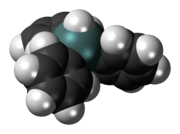Triphenyltin hydride
Triphenyltin hydride is the organotin compound with the formula (C6H5)3SnH. It is a white distillable oil that is soluble in organic solvents. It is often used as a source of "H·" to generate radicals or cleave carbon-oxygen bonds.
 | |
 | |
| Names | |
|---|---|
| IUPAC name
Triphenylstannane | |
| Identifiers | |
3D model (JSmol) |
|
| ChEBI | |
| ChemSpider | |
| ECHA InfoCard | 100.011.789 |
PubChem CID |
|
| RTECS number |
|
| UNII | |
CompTox Dashboard (EPA) |
|
| |
| |
| Properties | |
| C18H16Sn | |
| Molar mass | 351.036 g·mol−1 |
| Appearance | colorless |
| Density | 1.374 g/cm3 |
| Melting point | 28 °C (82 °F; 301 K) |
| Boiling point | 156 °C (313 °F; 429 K) (0.15 mm Hg) |
| insoluble | |
| Solubility in benzene, THF | soluble |
| Hazards | |
| Main hazards | toxic |
| R-phrases (outdated) | R23/24/25 R50/53 |
| S-phrases (outdated) | S26 S27 S28 S45 S60 S61 |
| Flash point | >230 °F |
| Related compounds | |
Related compounds |
SnCl4, (C6H5)3SnCl |
Except where otherwise noted, data are given for materials in their standard state (at 25 °C [77 °F], 100 kPa). | |
| Infobox references | |
Preparation and reactions
Ph3SnH, as it is more commonly abbreviated, is prepared by treatment of triphenyltin chloride with lithium aluminium hydride.[1] Although Ph3SnH is treated as a source of "H·", in fact it does not release free hydrogen atoms, which are extremely reactive species. Instead, Ph3SnH transfers H to substrates usually via a radical chain mechanism. This reactivity exploits the relatively good stability of "Ph3Sn·"[1]
gollark: Yep.
gollark: https://sqlite.org/fts5.html
gollark: Composing complex queries with OR, NEAR, etc?
gollark: Or not.
gollark: I believe that `bee apioform` looks up bee and apioform consecutively.
References
- Clive, D. L. J. "Triphenylstannane" in Encyclopedia of Reagents for Organic Synthesis (Ed: L. Paquette) 2004, J. Wiley & Sons, New York. doi:10.1002/047084289X.rt390
This article is issued from Wikipedia. The text is licensed under Creative Commons - Attribution - Sharealike. Additional terms may apply for the media files.